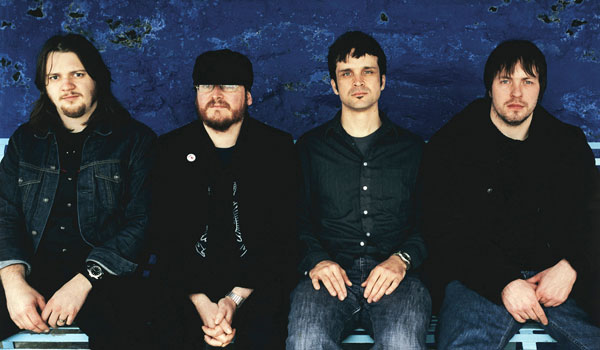
CONTACT
The Earlies
"These Were The Earlies“ was the name of the Brits and Texans’ debut album, which was released last year in Germany with some delay, and the title of the eleven pure white songs could hardly have been more telling. Listen, that was the Earlies, the band that had never seen its singer before. When Brandon Carr recorded his vocal tracks, it happened at home in Dallas, while the rest of the band tinkered around in the studio in Manchester on the big picture, on an orchestral sound in which flutes and saxophones, Beach Boys chorales, bassoon melodies and electronic trace elements found each other in strange ways. The Earlies played in a surreal sandbox that had previously only been haunted by Mercury Rev, the Beta Band and the Flaming Lips. Above and below was the faraway voice of Brandon Carr.
For the last recording of this album, Brandon Carr met his colleagues for the first time, whom he knew by hearsay, the Internet and transatlantic phone calls. They played "Dead Birds": "Bring Love To This Cold Cold Heart". "Brandon was a good guy, thank God," says pianist, organist and synthesizer Christian Madden, remembering the first studio session with the singer. "Imagine an asshole like that suddenly standing in front of you and saying he's the singer of the band. We would have had serious problems."
What happened up to that point: The band formed in Manchester in 1996 on a whim. Participants: Christian Madden and Giles Hatton (both from Burnley, north of Manchester) and John-Mark Lapham, a Texan with a limited residence permit in the UK, looking for a different kind of British music (he studied the Warp and 4AD catalogue). Sessions, spontaneous band expansions, heaps of ideas. Lapham leaves again. In a record shop in Abilene, Texas, the city to which the world owes the hair-raising magic of a girl called Jessica Simpson, he meets Brandon Carr, and this is where the American Earlies branch is formed, which keeps in touch with the Brits via the Internet and meddles in their files. It goes on like this for years.
"It's never too late to be Earlies," wrote the British "Observer," alluding to the band's hidden and strange history. It's time to discover the Earlies properly, with the eleven new songs from "The Enemy Chorus," which were recorded with Tom Knott in Burnley, Manchester and Texas. Brandon Carr now sometimes even comes to England for a few months. The changes can already be seen on the surface of the album: "We knew one thing, we wanted to have color this time." The Earlies logo in the shimmering blue and gold luxury design on the cover stands for the will to splendor and extravagance. They want to pour themselves out. Show what's going on like crazy in their heads. 70s progressive rock, loops, drone sound, the live experience, the recordings with King Creosote. The Earlies have gotten harder. No, they're not playing Black Sabbath monster rock yet, that might come on album number three. For now, you can hear how the many different tracks have been connected with psychedelic fluorescent glue to create fabulously rocking songs. Sometimes these songs seem to laugh at themselves, when a brass section from the Town Hall next door tries to fight against the completely normal indie melancholy. Was that a typewriter at the end of "Foundation And Earth"? Does anyone remember what that is, a typewriter? Have you laughed today?
And which band releases their entire album again on 10"? Every two months the Earlies will release two "Enemy Chorus" tracks on vinyl, up until the last piece, which is due to be released in July 2007, accompanied by a box in which the vinyl treasures can be kept. That was the second Earlies phase. We'll be talking about the third in the spring, when the band comes to Germany as a ten-person live orchestra.

